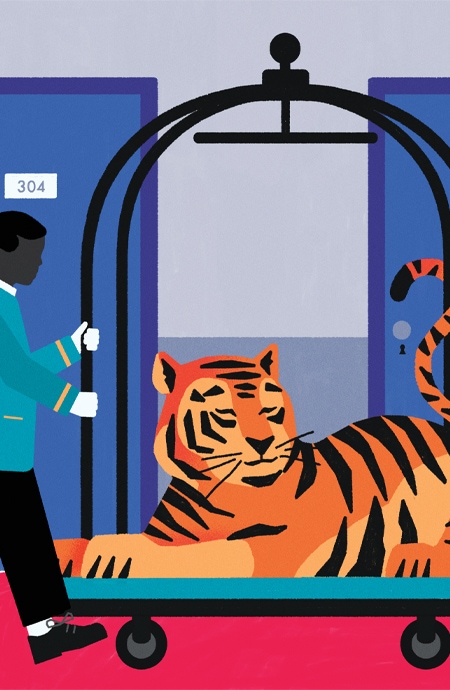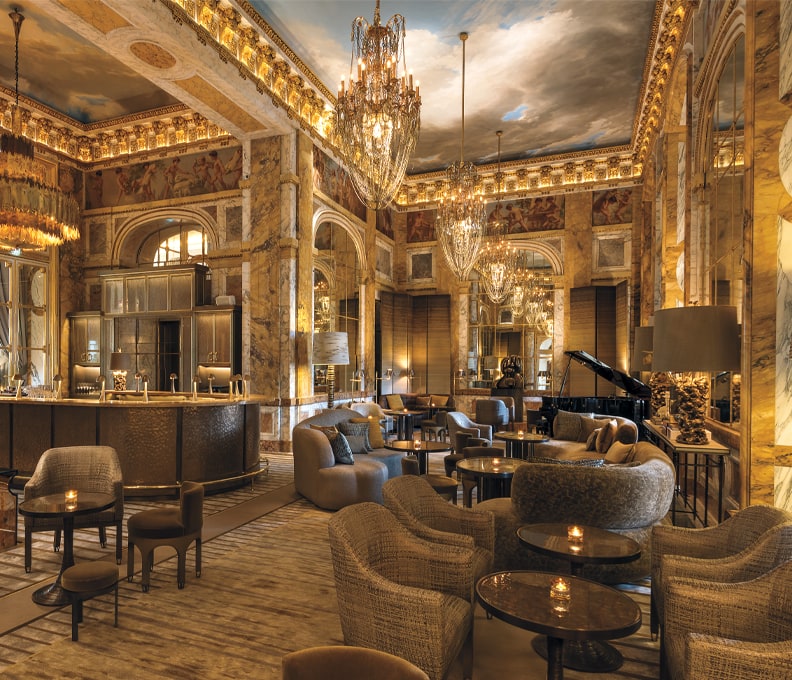Flying Tigers and Late-Night Dentists: How Hotel Concierges Make the Impossible Possible
Have a request that seems out of the question on a business or leisure trip? Simply turn to the miracle-working hotel concierge
October 10, 2022

Illustration by María Hergueta
I encountered my first hotel concierge when I was 12 years old, when my parents took me to Europe. As we walked through the main entrance of the storied Carlton hotel in Cannes, we passed the concierge. My mother firmly grasped my hand and ushered me right by that desk: “Don’t ask them anything.”
Traditionally, the concierge was a separate entity at the hotel, controlling a sort of medieval fiefdom. When you checked out, you got a bill from the hotel for your accommodations, and a second bill from the concierge for other services. And as a result, there was a long-standing fear among many first-time travelers about what concierges do. And how much they cost.
At the time I had no idea what my mother was talking about. Or her sticker-shock anxiety. Times have changed. Now, contrary to my mother’s admonition, I find myself asking hotel concierges everything.
I’m not going to tell you how long ago that visit to Cannes took place, but I can assure you the modern concept of a hotel concierge is very different. Many travelers define a concierge as someone who can find a last-minute ticket to a Broadway play, or secure a replacement for a lost cuff link or an extra pair of socks. But today’s concierges can do a lot more than just getting you a substitute tuxedo or those orchestra seats to Elton John. They can be true magicians, pulling rabbits out of a hat—new passports or visas, or finding 11th-hour private jets for a special charter flight.
WATCH: Meet the Father-Son Concierge Team at the Ritz London
The origin of a concierge goes back to a medieval position, comte des cierges, who aided castle residents and guests. The word derives from the Latin conservus, meaning servant. It evolved to refer to a doorkeeper or landlord representative in a residential building, sometimes called a portier. In the mid-to-late 19th century, luxury hotels that catered to wealthy guests led to a more modern concept of the concierge.
In 1929, the role became more formalized, when Pierre Quentin, a concierge at a premier Paris hotel, organized a meeting of a handful of fellow concierges to network and discuss best practices. He later became the first president of a European group, which in 1970 went international as Les Clefs d’Or (French for “the golden keys”). You can recognize these elite concierges by the double-crossed keys on their lapels designed by the Swiss jeweler Bucherer.
Its 3,500 vetted members are scattered across 44 countries, with about 20 percent at elite hotels in the U.S. But these days there’s almost a disconnect when it comes to concierges, with many travelers simply searching the Internet or scrolling social media for restaurants and other activities. As a result, the traditional concierge position is under threat. Some hotels give new hires a hat and call them a concierge, but in many cases all they can do is point you to a rack of brochures in the lobby. Other hotels have attempted to turn over the concierge duties to robots and avatars. Hilton Hotels’ Connie—named after founder Conrad—tells guests about nearby attractions, places to eat, and other hotel information. (It has not been a success.)
But a real concierge is a master in the art of conversation—and the keeper of contacts and relationships. A proper concierge doesn’t just tell you where to go shopping. He or she can arrange for the store to stay open after hours for a late-night spree. New York’s Baccarat Hotel defines its concierge as a “true bon vivant—a person who loves, more than anything, to eat, drink, chat and explore, someone who’ll share thoughtful, personal recommendations on everything from secret sunsets to an award-winning bar in Brooklyn.”
In my book, concierges are wizards. Because they have worldwide connections, and often employ a sort of secret handshake with influential people, if a guest needs something, they can deliver.

Illustration by María Hergueta
Few requests are impossible. One distraught guest at the Willard InterContinental hotel in Washington, D.C., was a new mother whose business trip had suddenly been extended by two days. Her baby was back in Texas with relatives. The concierge arranged for a cooler box with empty bottles packed with dry ice to be messengered to the hotel. Once the bottles had been filled with breast milk, the box was sent that same day to Texas.
Another guest, an international banker on the verge of signing a big contract, suddenly needed two bottles of the legendary and hard to find George Spies 1968 South African cabernet to help close the deal. Concierge Robert Watson made a few phone calls to a concierge in Cape Town, and the wine—at $2,000 a bottle—was hand-delivered in time to commemorate the contract signing.
One guest at a San Francisco hotel asked the concierge to provide distilled water for her shower. Short of a plumbing miracle, a special pump (and the water) appeared. At Dublin’s Shelbourne, another guest needed help with ancestry research prior to his wedding. A genealogist was dispatched within minutes of the ceremony. A Miami hotel guest asked the concierge to ship his pet tiger to London with only two days’ notice. (The tiger flew.) In Los Angeles, a concierge was asked by a guest to arrange a special marriage proposal. At precisely 5 p.m., while the man was sitting with his girlfriend on the beach in Malibu, a skywriter flew overhead with the message, and a tuxedoed waiter from the hotel suddenly arrived with champagne, flowers and the ring (proposal accepted).

Illustration by María Hergueta
And then there are the little things. Most concierges keep a special drawer or closet filled with dozens of items such as buttons, cuff links and sewing needles. At the Boston Harbor Hotel, head concierge Nathan Goff keeps three pairs of men’s dress shoes—sizes 9 ½, 10 and 10 ½—on hand along with an ample supply of bobby pins. Among the most requested emergency items are black bow ties. Many concierges not only pride themselves in the black-tie department, but they’re also trained to help guests tie them properly.
We can’t overlook the medical and dental emergencies. One guest lost a tooth during dinner, right before an important breakfast meeting the next morning. The hotel concierge knew whom to call, and even though it was after 11 p.m., dispatched the guest—with a driver who waited—to a late-night dentist. The next morning, the guest called to thank the concierge for the rescue. He reported that the meeting had gone very well, and wanted to celebrate at the hottest restaurant in the city with a table for four. The concierge not only secured the table—he was invited to dinner.




